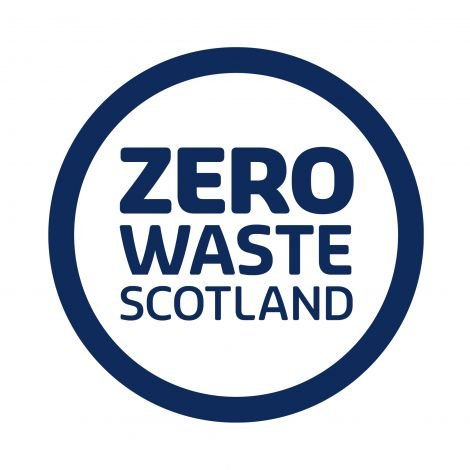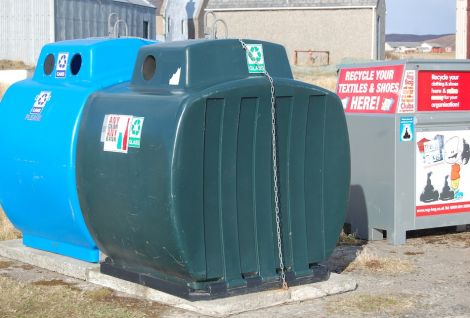News / SIC plan for isles-wide recycling collections
KERBSIDE recycling is to be introduced throughout the isles if councillors give the green light to proposals for a radical overhaul of how Shetland Islands Council deals with household waste.
Having abandoned a previous, more limited form of recycling collection more than four years ago, Shetland lags far behind the rest of Scotland in recycling less than a tenth of rubbish.
But the Scottish Government’s drive to bolster environmental regulations and reduce carbon emissions is gathering pace, and funding from Zero Waste Scotland (ZWS) has enabled the local authority to put together a plan that would see it collect paper, card, plastic, cans and cartons from householders for recycling.
The details are set out in a report due to be debated by the SIC’s environment and transport committee on Monday (28 August) which suggests a new recycling collection timetable should be established from July next year.
The council, which signed up to the Scottish Government’s household recycling charter in October 2016, has been working closely with ZWS to devise the system in recent months.
ZWS has offered transitional funding of £579,000 to the SIC, which would cover the £500,000 cost of providing new waste receptacles for households as well as £63,500 for a contractor to provide “communications project management support” to help get the message out about the new service.
The report recommends taking advantage of the ZWS funding offer because the council will have to act sooner or later, and otherwise risks “even greater recycling transition costs being borne by the SIC in the coming years”.
In addition capital funding of around £750,000 would be needed for a new shed and sorting equipment to enable the council to sort and store recycling materials prior to shipping. That funding would be sought from the SIC’s “spend to save” and “change fund” budgets.
Become a member of Shetland News
Shetland’s recycling rate has plummeted to a Scotland-wide low of just nine per cent against a national average of 44 per cent since kerbside collection in Lerwick and Scalloway ceased in April 2013.
An existing derogation allowing Shetland’s household waste to be incinerated at the Greenhead-based energy recovery plant will not be extended, while the government is targeting a recycling rate of 70 per cent by the middle of the next decade.
Under the new proposals, contained in a report from SIC waste management team leader Colin Bragg, it is forecast that the cost of weekly collection from over 11,000 households would not rise.
In fact, a hypothetical recycling rate of 20 per cent would generate enough income to cut the cost of collecting waste by £25,000 a year from a current level of £1.17 million.
“Collection would, where possible, be at existing collection points and existing routes,” the report states. “Non-recyclable waste will be collected fortnightly from the usual collection location for each household.”
It also notes that “much of the content of a typical black refuse bag in Shetland is recyclable – but very difficult to separate form residual non-recyclable waste”.
“Adopting this new collection model will make a sorting process viable and allow the SIC to access high-value recycling income streams,” the report continues.
There is a proposed four-week cycle whereby non-recyclable waste would be collected one week, paper and card in the second week, non-recyclable waste in the third week and then plastic, cans and cartons in the fourth week.
If it wins councillors’ backing, the plan would initially begin on one route in an unspecified area of Shetland in early 2018 to enable officials to gauge how the system works ahead of full implementation next summer.
ZWS estimates that the quantity of waste recycled would rise from around 220 tonnes a year to somewhere between 1,150 and 1,750 tonnes.
Meanwhile, the report also notes that the SIC is currently discussing the possibility of transferring responsibility for the energy recovery plant to Shetland Heat Energy and Power (SHEAP).
A move towards greater recycling would force the plant to alter its business model to “find and use waste streams that maintain sufficient calorific content” – but it notes a “significant demand for places to take residual waste” that is likely to intensify when new legislation comes into force banning biodegradable waste from going to landfill by 2021.
Become a member of Shetland News
Shetland News is asking its many readers to consider paying for membership to get additional features and services: -
- Remove non-local ads;
- Bookmark posts to read later;
- Exclusive curated weekly newsletter;
- Hide membership messages;
- Comments open for discussion.
If you appreciate what we do and feel strongly about impartial local journalism, then please become a member of Shetland News by either making a single payment, or setting up a monthly, quarterly or yearly subscription.





























































